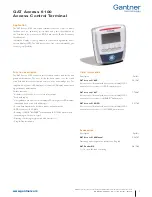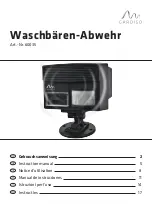
USER'S GUIDE
COMMAND SUMMARY
PK232UG Rev. B 9/86
6-57
159
PACLEN
n
Mnemonic:
PACL
Default: 128
Mode: Packet
Parameters:
n
-
0 to 255 specifies the maximum length of the data portion of a packet.
0 -
Zero is equivalent to 256.
PACLEN
sets the maximum number of data bytes to be carried in each packet's "information field".
"User data" means the characters you actually type at your keyboard (or send from a stored file).
Your PK-232 automatically sends a packet when the number of characters you type for a packet
equals
n
. This value is used in both Converse and Transparent Modes.
Most keyboard-to-keyboard operators use the default value of 128 bytes for routine VHF/UHF
packet services.
Experiment with different values for
MAXFRAME
and
PACLEN
to find the combination best suited to
your operating conditions – especially if you are transferring files.
The lower the value of
PACLEN
, the greater the probability of getting packets though the link
without "hits" or retries.
Increase
PACLEN
to 256 if transferring files to a nearby station over a high quality path.
Reduce
PACLEN
to 64, or even 32 when working "difficult" HF radio paths.
If the radio link is good and optimal relationship will exist between the parameter set by these
commands. Set
PACLEN
so that the maximum number of characters outstanding doesn't ex-
ceed the receive buffer space of the TNC receiving the data.
NOTE:
It is not necessary that two TNCs be set to the same
PACLEN
value to exchange
data; however, some TNCs may not be compatible when frames contain more than
128 data characters.
PACTIME
EVERY/AFTER
n
Mnemonic: PACT
Default: AFTER 10
Mode: Packet
Parameters:
n
-
0 to 250 specifies 100-millisecond intervals.
EVERY -
Packet time-out occurs every
n
times 100 milliseconds.
AFTER -
Packet time-out-occurs when
n
times 100 milliseconds elapse with-
out input from the computer or terminal.
The
PACTIME
parameter is always used in Transparent Mode.
PACTIME
is also used in Converse
Mode if
CPACTIME
is ON.
When EVERY is specified, the characters you type or send from disk are packaged and queued
for transmission every
n
times 100 milliseconds.
When AFTER is specified, the characters you type or send from disk are packaged when input
from the terminal stops for
n
times 100 milliseconds.
A zero-length packet will never be produced. The timer is not started until the first character or
byte is entered.
A value of 0 (zero) for
n
is allowed; zero means packets are sent with no wait time.
















































